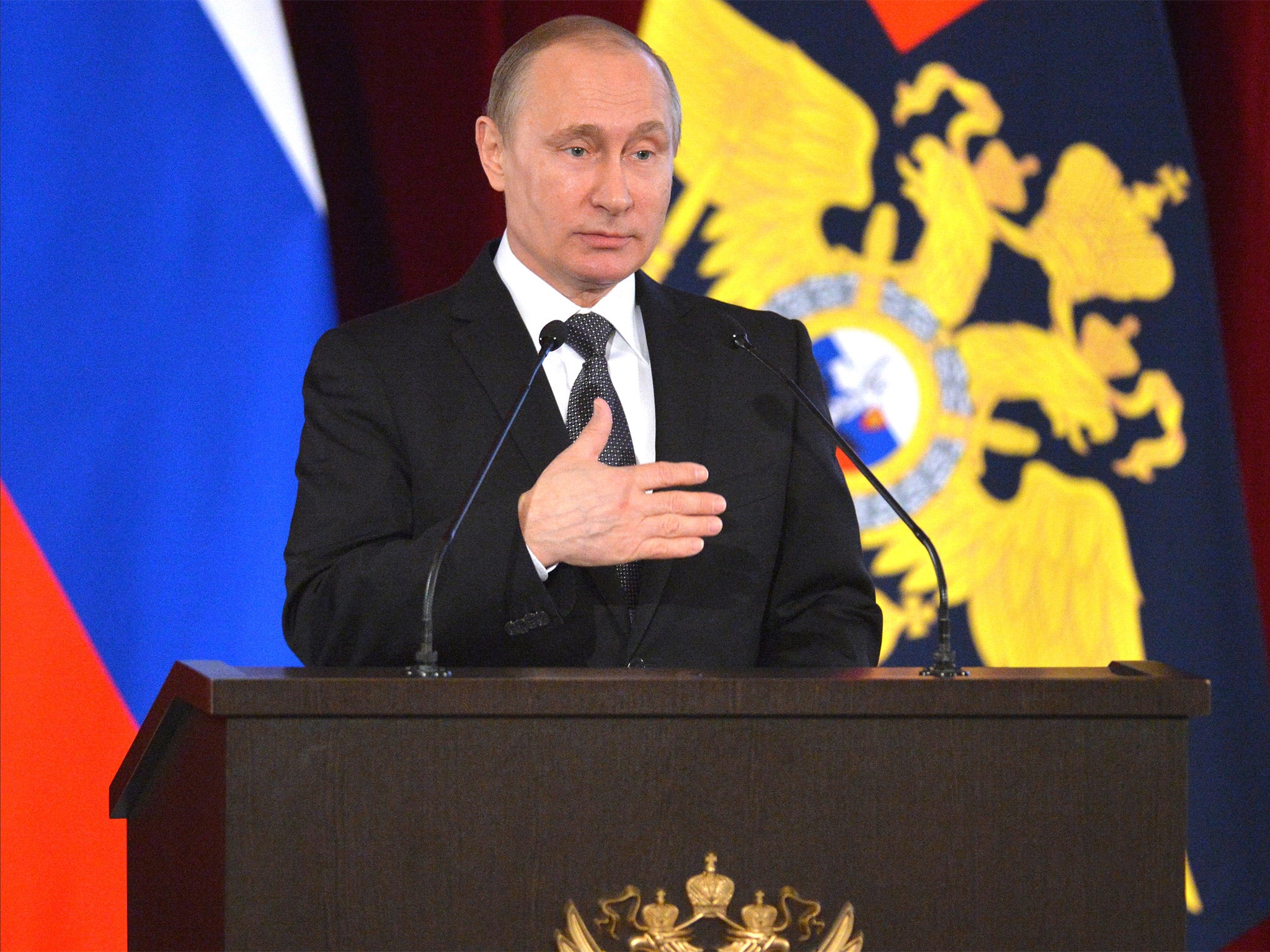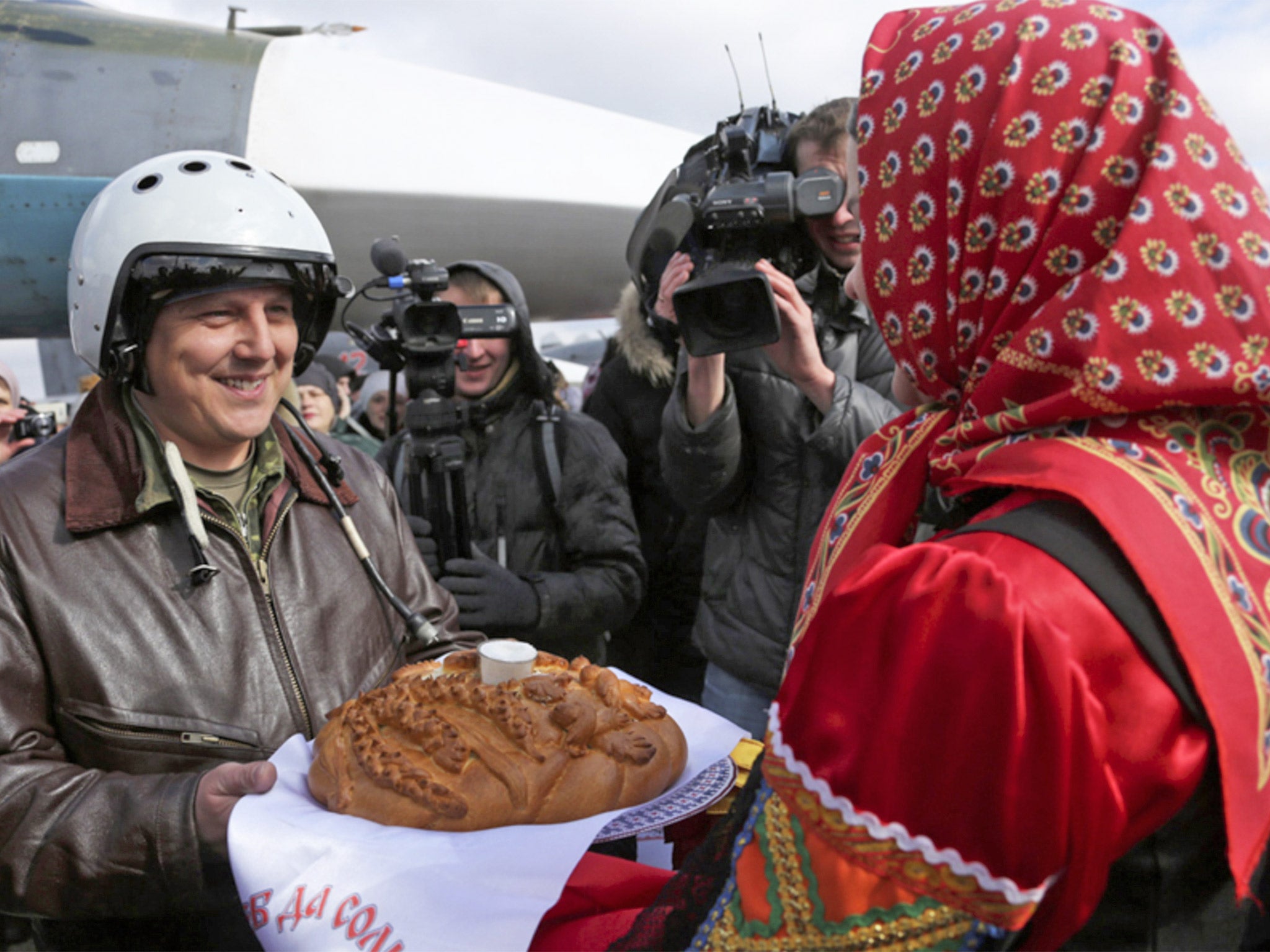Syria crisis: Vladimir Putin 'willing to ditch President Bashar al‑Assad to end five-year conflict'
Western diplomats believe Putin is now willing to force the Syrian dictator out of office

Your support helps us to tell the story
From reproductive rights to climate change to Big Tech, The Independent is on the ground when the story is developing. Whether it's investigating the financials of Elon Musk's pro-Trump PAC or producing our latest documentary, 'The A Word', which shines a light on the American women fighting for reproductive rights, we know how important it is to parse out the facts from the messaging.
At such a critical moment in US history, we need reporters on the ground. Your donation allows us to keep sending journalists to speak to both sides of the story.
The Independent is trusted by Americans across the entire political spectrum. And unlike many other quality news outlets, we choose not to lock Americans out of our reporting and analysis with paywalls. We believe quality journalism should be available to everyone, paid for by those who can afford it.
Your support makes all the difference.Vladimir Putin is willing to jettison President Bashar al‑Assad as part of a deal to end the five-year conflict in Syria, Western powers believe.
Following the surprise declaration by the Russian President that his five-month military mission in the country had fulfilled its objective, diplomats are convinced that Moscow could be ready to force the Syrian leader to allow a political transition.
Russian warplanes and troops began leaving bases in Syria on 15 March, just hours after Mr Putin’s shock announcement that he would begin a partial draw-down, timed for maximum impact to coincide with the fifth anniversary of the Syrian uprising and the resumption of peace talks in Geneva.
While they remain cautious about the extent of the military reduction, Western diplomats predict that Mr Putin is now prepared to sacrifice the Syrian President.
After a military campaign that was officially launched to tackle terrorist groups but has largely focused on bolstering the ailing Syrian army, the diplomats say that the Russian president has achieved his aims of protecting Russia’s interests in Syria and re-establishing Moscow as a major player in the Middle East. They believe that Mr Putin has no qualms about jettisoning Mr Assad as long as there is continuity with the old Baathist regime that allows them to remain a key player in the country’s future – and retain its two military bases in the country. “We understand that Putin is not tied inextricably to Assad,” one diplomat told The Independent. Another argued: “The Russians know that he’s a destabilising force. If there’s going to be a peaceful transition, he ain’t staying.”
On 15 March, Syrians marked the fifth anniversary of the start of the uprising in their country. Having begun in 2011 with peaceful protests against President Assad, it descended into a deadly armed conflict that has claimed the lives of at least 250,000 people, spawned a series of terrorist groups and increasingly dragged in neighbouring countries and global powers.
Many remain sceptical of the true motives behind Mr Putin’s announcement, and analysts pointed out that he would retain plenty of room for manoeuvre. Russia’s Deputy Defence Minister, Nikolai Pankov, said that Russian warplanes would still attack “terrorist targets” – a term that Russia has used to justify attacks on more moderate opposition forces as well as civilian targets such as schools and hospitals.

Even if Mr Putin fulfils his promise to reduce troops, Western officials expect that he will still have a bigger military presence in Syria than he did before the start of his military campaign at the end of September. An airbase at Hmeymim and a naval facility at Tartus, both on the Syrian coast, mean that Russia will retain the ability to rapidly scale its presence in the country back up. By leaving in place a powerful S-400 air defence system, it will retain control of the airspace.
Optimists suggested, however, that Mr Putin could be serious about trying to put an end to the fighting. They point to the fragile ceasefire forged between Washington and Moscow that has exceeded all expectations by lasting more than two weeks thanks to heavy pressure from international powers on their clients in Syria. They also highlight increasing signs of gaps between Moscow and Damascus which have seen Russian officials publicly warn Mr Assad against spoiling peace efforts.
Philip Hammond, the British Foreign Secretary, told the House of Commons that Russia had made past pledges to pull its troops out of Ukraine that “later turned out to be merely routine rotation of forces”. The official Syrian opposition delegation said that it would need to “wait and see” before judging whether to take the announcement seriously.
John Kerry, the US Secretary of State, announced that he would visit Moscow next week, adding that the world had reached “a very important phase” in the peace efforts.
Staffan de Mistura, the UN diplomat charged with leading peace talks, said that Mr Putin’s announcement was a “major development”. He said that the refugee crisis, the Russian intervention and the threat of Isis had given negotiations a “new momentum”.
Huge questions remain about the steps that would be required to put an end to President Assad’s 16-year rule. While Mr de Mistura has said that he aims to create a transitional governing body and hold elections within 18 months, it remains unclear who would be a member of that body and what role Mr Assad would play.
Western diplomats said that Mr Assad could play a role in the process before eventually departing under pressure from Moscow – an arrangement that would be tolerated by the opposition if it had a firm guarantee that the President would depart.
There were signs in Geneva that officials and participants had been made giddy by the surprise Russian announcement. At the Hotel Royal, the four-star hotel where the opposition is staying for the talks, several members of the delegation shed tears of joy when they learnt of Mr Putin’s announcement late on 14 March.
One official raised the prospect that international peacekeepers could be on the ground in Syria in as little as six months.
Join our commenting forum
Join thought-provoking conversations, follow other Independent readers and see their replies
Comments